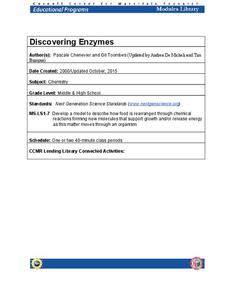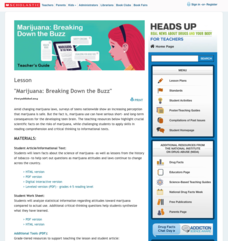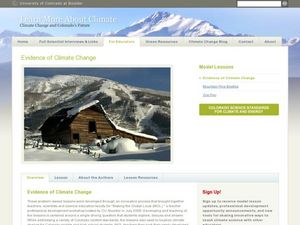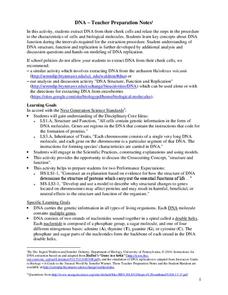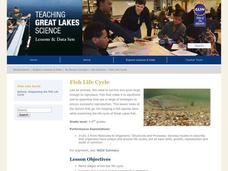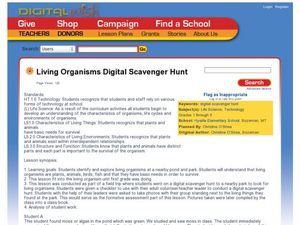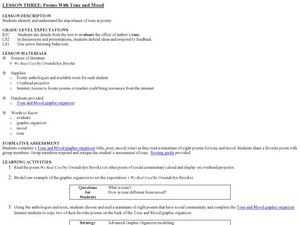Cornell University
Discovering Enzymes
Explore the function of enzymes through a series of lab investigations. Learners use household enzymes such as hydrogen peroxide to model the role of enzymes. The enzymes break down proteins with and without a catalyst.
Scholastic
Marijuana: Breaking Down the Buzz
Teenagers get the real information about marijuana use based on the history of tobacco legislation and research. As they read an educational passage about marijuana laws, science, and changing attitudes, they address their preconceptions...
Next Generation Science Storylines
How Can We Sense so Many Different Sounds from a Distance?
Dive into the mystery of sound waves! Scholars brainstorm questions about how sound travels and why different items make different sounds. They then conduct experiments to answer their questions.
Howard Hughes Medical Institute
Human Skin Color: Evidence for Selection
Skin color is controlled by at least six genes. Young scientists learn about skin colors through a documentary. They discuss the topics of pigment, natural selection, and vitamin D absorption. They apply their knowledge to higher order...
Serendip
A Scientific Investigation – What Types of Food Contain Starch and Protein?
You are what you eat, as they say! Are you more starch or more protein? Young scholars use their knowledge of each component to test different foods for their content. Using multiple indicators, individuals describe the protein and...
Serendip
Where Does a Plant's Mass Come From?
Where does the mass for a growing tree come from? Scholars consider a few different hypotheses and guess which is correct. They then analyze data from different experiments to understand which concepts science supports.
Serendip
UV, Mutations, and DNA Repair
How effective are cells at repairing UV damage? An inquiry-based lesson has learners experiment with organism by exposing them to various levels of UV light and then examining their DNA after a period of time. Pupils test different...
Serendip
From Gene to Protein via Transcription and Translation
DNA carries the codes for creating just the right protein. A well-designed lesson plan leads pupils through the process from start to finish and everywhere in between. Guiding questions with supporting video help scholars understand the...
National Park Service
The Young Naturalist
Beginning with a brief history of our 26th president, Theodore Roosevelt, then followed by a discussion of his interest in nature, young scientists take to the outdoors to locate and observe local plants and insects. Scholars return to...
Serendip
The Molecular Biology of Mutations and Muscular Dystrophy
Different types of mutations cause unique types and degrees of muscular dystrophy. Scholars learn about the types of mutations and the impact on the body. They compare the location of the mutations and draw conclusions about how it is...
Serendip
Soap Opera Genetics – Genetics to Resolve Family Arguments
Did she cheat on her husband? Did the hospital switch the babies? Should they have children? As much as this sounds like the plot for a soap opera, all of these questions fit into a single lesson on genetics. Scholars read about three...
Howard Hughes Medical Institute
Lactose Intolerance: Fact or Fiction
Around the world, about 2/3 of adult humans are lactose intolerant. Scholars work in small groups to discuss a few statements about lactose intolerance. Then, they watch a video on the topic and readdress each statement. Whole-class...
Curated OER
Germs and Your Body
Students study germs and ways your body fights against disease. In this germs lesson students complete an activity that demonstrates where germs can get into your body.
Curated OER
Alcoholic Fermentation in Yeast
Biology learners investigate the effect of sucrose concentration on yeast alcoholic fermentation. During the lesson,they compare and contrast the processes of cellular respiration and alcoholic fermentation. They design an experiment to...
Curated OER
Evidence of Climate Change
Sixth graders examine climate change in the state of Colorado. In this climate activity, 6th graders watch 2 video clips regarding the topic and research the subtopics- snow pack, precipitation, temperature, forest fires, river flow,...
Curated OER
Tableau
Second graders view a video from United Streaming and design still frames of important parts of a story. In this story-telling from different cultures lesson, 2nd graders understand general vocabulary about performing. Students pose to...
Curated OER
Theatre Lesson Plan- Tableau (part 2)
Students explore tableaux. In this social studies and fine arts cross curriculum instructional activity, students work in groups of four to create "frozen" stage pictures (tableaux) representing vocabulary and concepts from a "From Farm...
Curated OER
Descriptive Writing
Learners write a one-page description of a postcard received from the teacher. After finishing, they tape postcards to the blackboard and number them. They read their descriptions, while other students guess which card the student is...
Curated OER
Oral Directions: Practice for the Slam
Students practice their poetry presentations. In this poetry slam lesson, students use the provided practice feedback form to prepare for presenting their poems prior to participating in their own poetry slam competition.
Curated OER
Extracting DNA from Your Cells - Teacher Preparation Notes
Students extract their own DNA from cheek cells. In this biology instructional activity, students explain the replication process. They identify the structure and composition of DNA.
Michigan Sea Grant
Fish Life Cycle
Fish are no different when it comes to a living being's primary objective—to reproduce. They do differ, including from fish species to fish species, in their life cycles, survival tactics and reproductive strategies. After discussion of...
Curated OER
Living Organisms Digital Scavenger Hunt
Students photograph living organisms. In this plan for a field trip, students go to a local park or pond and photograph themselves with various living organisms on their scavenger hunt list. The photographs taken are compiled into a...
Curated OER
Performance Poetry as Social Commentary
Learners explore poetry that examines social concerns. In this poetry lesson, students research poems and poets. Learners present their findings to their classmates.
Curated OER
Poems with Tone and Mood
Young scholars examine the use of tone in poetry. In this literature lesson, students read "We Real Cool," by Gwendolyn Brooks and use the provided graphic organizer to chart the poem's tone and mood.


